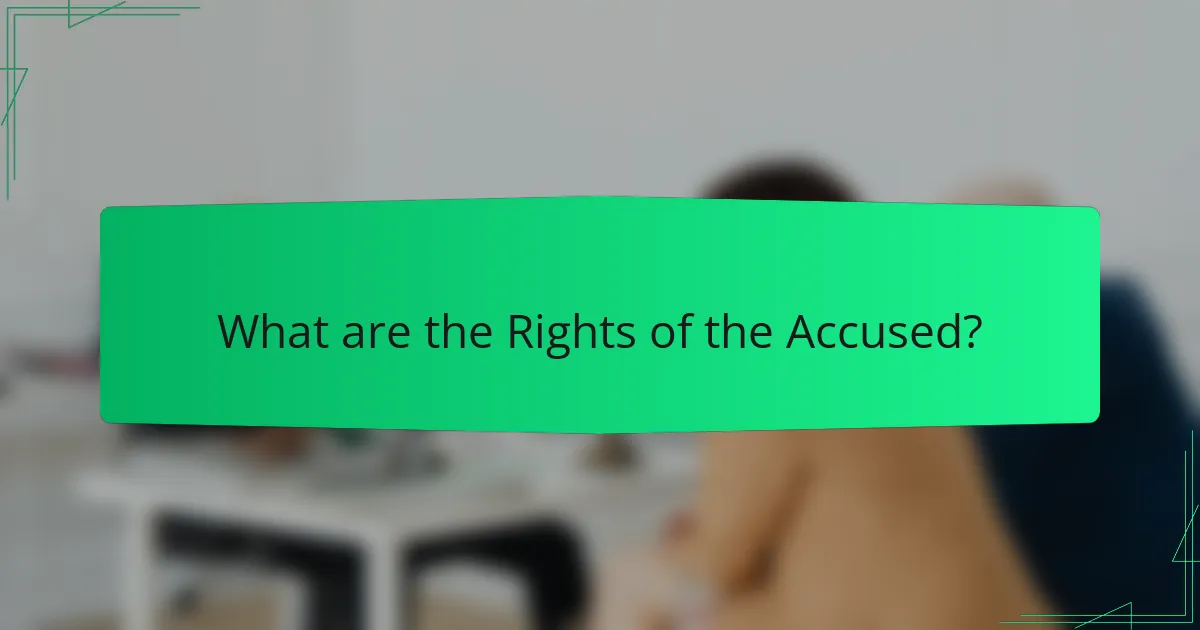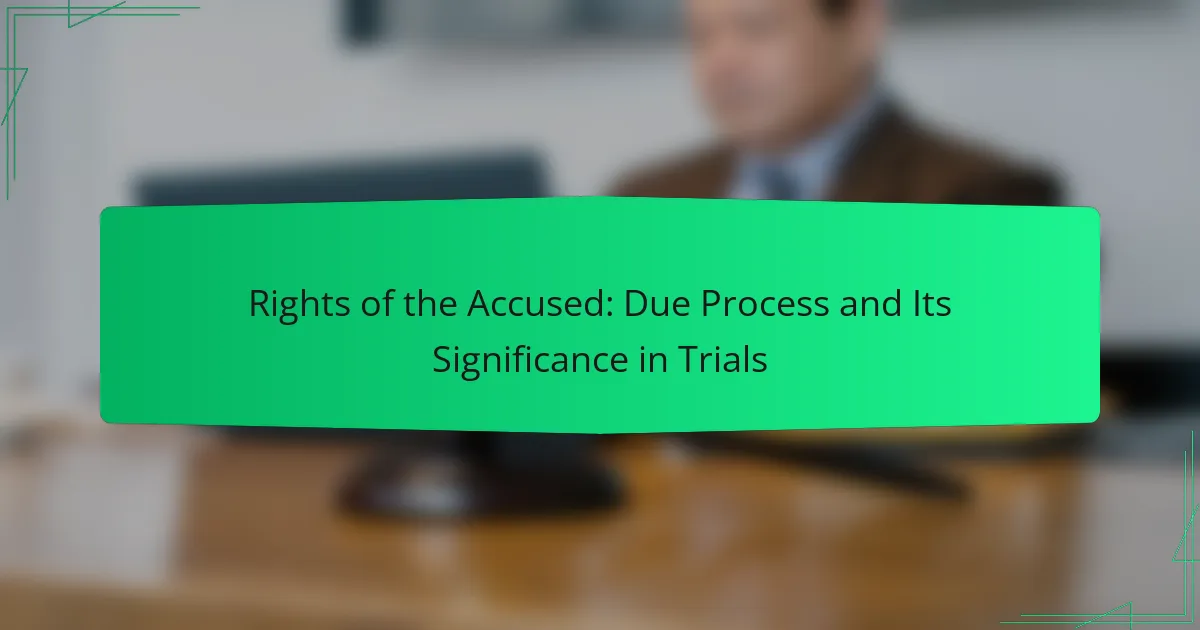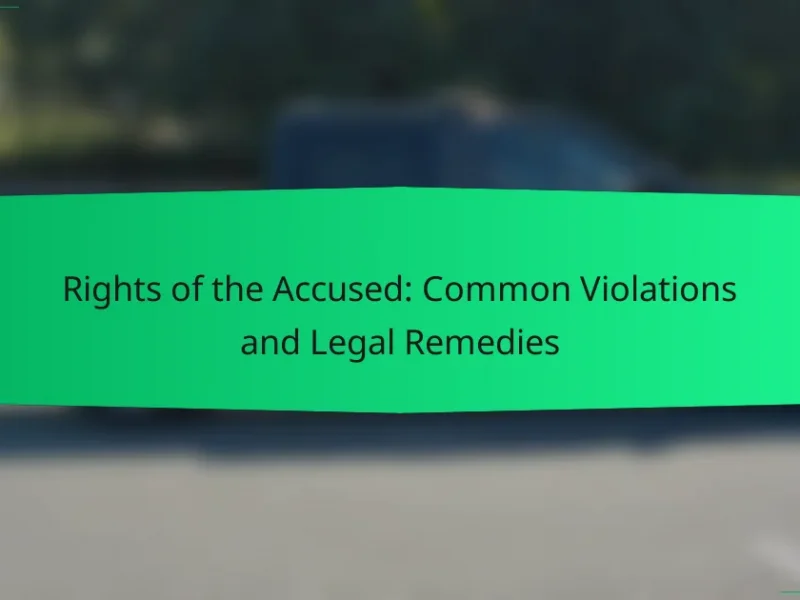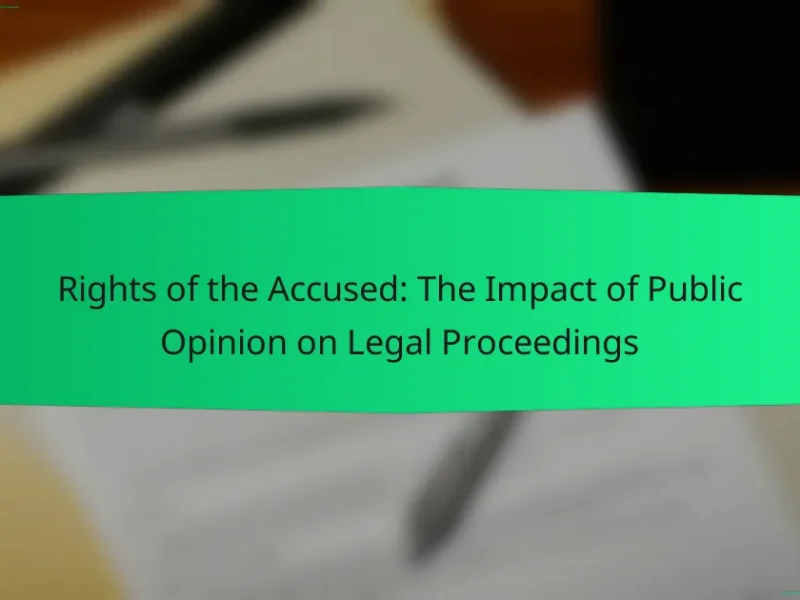The article focuses on the rights of the accused, which include the right to a fair trial, the right to remain silent, and the right to legal counsel, as protected by the Sixth Amendment of the U.S. Constitution. It emphasizes the significance of due process in legal proceedings, ensuring individuals are treated fairly and have the opportunity to defend themselves. The article also addresses challenges such as systemic biases, inadequate legal representation, and the influence of public opinion on judicial outcomes. Historical cases like Gideon v. Wainwright highlight the importance of legal counsel, while the overarching theme underscores the necessity of maintaining justice and individual rights within the judicial system.

What are the Rights of the Accused?
The rights of the accused include the right to a fair trial, the right to remain silent, and the right to legal counsel. These rights are protected under the Sixth Amendment of the U.S. Constitution. The right to a fair trial ensures that the accused has an impartial jury and the opportunity to present a defense. The right to remain silent protects against self-incrimination, allowing the accused to avoid providing evidence that could be used against them. The right to legal counsel guarantees that the accused can have an attorney represent them during legal proceedings. These rights are fundamental to ensuring justice and protecting individuals from wrongful convictions.
How do these rights protect individuals in the legal system?
These rights protect individuals in the legal system by ensuring fair treatment and safeguarding against abuse. They guarantee the right to a fair trial, which includes an impartial jury and legal representation. These rights also protect against self-incrimination and double jeopardy. Additionally, they ensure the right to be informed of charges and to confront witnesses. Such protections help maintain the integrity of the judicial process. Historical documents, like the Sixth Amendment of the U.S. Constitution, outline these fundamental rights. Studies show that due process rights significantly reduce wrongful convictions and enhance public trust in the legal system.
What specific rights are guaranteed to the accused?
The accused are guaranteed several specific rights. These rights include the right to remain silent. This protects against self-incrimination. The right to legal counsel is also guaranteed. This ensures access to representation during legal proceedings. The accused have the right to a fair trial. This includes an impartial jury and a public hearing. Additionally, they have the right to be informed of the charges against them. This allows for adequate preparation of a defense. The right to confront witnesses is also essential. This ensures the accused can challenge the evidence presented. Lastly, the right to due process is fundamental. This protects against arbitrary denial of life, liberty, or property.
Why are these rights important for a fair trial?
These rights are crucial for a fair trial as they ensure justice and protect individuals from wrongful convictions. Rights such as the presumption of innocence, the right to legal representation, and the right to a public trial contribute to transparency. They allow the accused to present their case effectively. These rights also help prevent abuses of power by the state. Historical cases show that lack of these rights can lead to miscarriages of justice. For instance, the case of Gideon v. Wainwright established the right to counsel, highlighting its necessity for fair legal representation. Overall, these rights safeguard the integrity of the judicial system.
What is Due Process?
Due process is a legal principle that ensures fair treatment through the judicial system. It guarantees that individuals receive notice of legal proceedings and an opportunity to be heard. Due process is enshrined in the Fifth and Fourteenth Amendments of the U.S. Constitution. These amendments protect against arbitrary denial of life, liberty, or property. The principle requires that laws be applied fairly and consistently. It also mandates that legal proceedings follow established rules and principles. This concept is vital in safeguarding individual rights during trials. Due process helps maintain public confidence in the legal system.
How does Due Process relate to the rights of the accused?
Due process is a legal principle that ensures fair treatment in the judicial system. It relates to the rights of the accused by guaranteeing them essential protections during legal proceedings. These protections include the right to a fair trial, the right to be heard, and the right to legal representation. The Fifth and Fourteenth Amendments of the U.S. Constitution explicitly outline these due process rights. Historical cases, such as Gideon v. Wainwright, established the right to counsel for defendants who cannot afford an attorney. Additionally, due process mandates that individuals cannot be deprived of life, liberty, or property without lawful procedures. This framework safeguards against arbitrary decisions by the state and upholds the integrity of the legal system.
What are the historical foundations of Due Process in law?
Due Process in law has historical foundations rooted in English common law. It emerged from the Magna Carta of 1215, which established the principle that no one could be deprived of liberty without lawful judgment. This concept evolved through the centuries, influencing the development of legal systems in various countries. The Petition of Right in 1628 further solidified these rights by challenging arbitrary imprisonment. In the United States, the Fifth and Fourteenth Amendments enshrined Due Process in the Constitution. These amendments protect individuals from government abuse and ensure fair legal proceedings. The historical trajectory of Due Process reflects a commitment to individual rights and justice.
How is Due Process implemented in trials?
Due process is implemented in trials through a series of legal safeguards. These safeguards ensure fair treatment and justice for the accused. Key components include the right to a fair trial, which mandates impartial judges and juries. The accused has the right to be informed of charges, allowing for a proper defense. Legal representation is guaranteed, ensuring the accused can navigate the legal system effectively. The prosecution must prove guilt beyond a reasonable doubt, protecting against wrongful convictions. Additionally, the right to appeal provides a mechanism for reviewing trial outcomes. These principles are enshrined in the Fifth and Fourteenth Amendments of the U.S. Constitution, emphasizing their foundational role in the legal system.
What are the steps involved in ensuring Due Process?
Ensuring due process involves several key steps. First, individuals must be informed of the charges against them. This ensures they understand the accusations and can prepare a defense. Next, they have the right to legal representation. Access to an attorney is crucial for fair legal proceedings.
Additionally, a fair and impartial hearing must be conducted. This includes the presence of an unbiased judge and jury. The accused must also have the opportunity to present evidence and witnesses. This allows for a comprehensive examination of the case.
Moreover, the right to appeal is essential. It provides a mechanism for challenging decisions made during the trial. Overall, these steps are fundamental to upholding the principles of due process as established in the Fifth and Fourteenth Amendments of the U.S. Constitution.
How do courts evaluate violations of Due Process?
Courts evaluate violations of Due Process by assessing whether a legal procedure was fair and just. They examine if the accused received adequate notice and an opportunity to be heard. Courts consider the nature of the right involved and the impact of the violation on the outcome of the case. The standard of review often involves determining if the violation was harmless or if it affected the fundamental fairness of the trial. Additionally, courts may refer to precedents and constitutional standards as benchmarks for evaluation. For instance, the Supreme Court has established that procedural due process requires notice and a meaningful opportunity to be heard.

What is the significance of Due Process in Trials?
Due process is significant in trials as it ensures fair legal proceedings. It protects individuals from arbitrary denial of life, liberty, or property. The Fifth and Fourteenth Amendments of the U.S. Constitution guarantee this right. Due process requires that legal proceedings follow established rules and principles. This includes the right to be heard, the right to an impartial tribunal, and the right to present evidence. It also mandates notification of charges and the opportunity for defense. Historical cases, like Gideon v. Wainwright, illustrate its importance in providing legal representation. Overall, due process maintains the integrity of the judicial system and upholds individual rights.
Why is Due Process essential for justice?
Due process is essential for justice because it guarantees fair treatment through the judicial system. It ensures that individuals receive notice of legal actions against them. Due process provides the right to a fair hearing or trial. This principle protects against arbitrary decisions by the government. It is enshrined in the Fifth and Fourteenth Amendments of the U.S. Constitution. These amendments require that no person be deprived of life, liberty, or property without due process of law. Historical cases, like Gideon v. Wainwright, highlight its importance in providing legal representation. Thus, due process is fundamental in upholding the rule of law and protecting individual rights.
How does Due Process contribute to public trust in the legal system?
Due Process enhances public trust in the legal system by ensuring fair treatment and transparency. It guarantees that individuals have the right to a fair trial, legal representation, and an opportunity to present their case. These protections foster confidence among citizens that justice is served impartially. According to the American Bar Association, adherence to due process principles reduces perceptions of bias and corruption. When people believe they will receive fair treatment, they are more likely to trust the legal system. Historical examples, such as the landmark case of Gideon v. Wainwright, demonstrate the importance of legal representation in upholding due process. This case established the right to counsel, reinforcing public faith in equitable legal proceedings.
What are the consequences of ignoring Due Process?
Ignoring due process can lead to serious legal consequences. It undermines the fairness of judicial proceedings. Defendants may face wrongful convictions without proper legal representation. This can result in imprisonment based on insufficient evidence. Additionally, ignoring due process can lead to appeals and retrials. Courts may dismiss cases if due process is violated. This can waste judicial resources and time. Historical cases show that due process violations often lead to public outcry and loss of trust in the legal system.
How does Due Process affect trial outcomes?
Due Process significantly influences trial outcomes by ensuring fair legal procedures. It mandates that all parties receive notice and an opportunity to be heard. This principle protects against arbitrary decisions by the state. For instance, the U.S. Constitution guarantees due process in the Fifth and Fourteenth Amendments. Violations of due process can lead to the dismissal of charges or reversal of convictions. Courts often assess whether due process was upheld in evaluating trial fairness. A lack of due process can undermine public confidence in the legal system. Thus, adherence to due process is crucial for just trial outcomes.
What role does Due Process play in protecting the innocent?
Due Process plays a critical role in protecting the innocent by ensuring fair legal procedures. It mandates that individuals are given notice of charges against them. This principle allows the accused to prepare a defense. Due Process also guarantees the right to a public trial. This transparency helps prevent wrongful convictions. Additionally, it ensures the right to an impartial jury. An unbiased jury is essential for a fair trial. The Fifth and Fourteenth Amendments enshrine these rights in the U.S. Constitution. Historical cases, such as Gideon v. Wainwright, demonstrate the importance of legal representation in protecting the innocent.
How can Due Process influence jury decisions?
Due process influences jury decisions by ensuring fairness and legal standards in trials. It requires that all legal rights of the accused are respected. This can affect how jurors perceive evidence and testimonies. For example, if due process is violated, jurors may question the legitimacy of the evidence presented. Additionally, adherence to due process helps maintain the integrity of the judicial system. Jurors are more likely to trust a trial that follows due process. This trust can lead to more balanced and impartial verdicts. Research shows that juries are sensitive to procedural fairness. A study by Tyler (1990) indicates that perceived fairness in legal processes impacts juror satisfaction and compliance with verdicts.

What challenges exist in upholding the Rights of the Accused?
Challenges in upholding the Rights of the Accused include systemic biases, lack of legal representation, and public opinion pressures. Systemic biases can lead to unequal treatment based on race, socioeconomic status, or other factors. Many accused individuals cannot afford legal counsel, which compromises their defense. Public opinion can influence judicial outcomes, undermining the presumption of innocence. Additionally, procedural delays can hinder timely access to justice. These challenges create a complex environment that often affects the fair treatment of accused individuals in the legal system.
What are common violations of these rights?
Common violations of the rights of the accused include denial of legal representation, lack of a fair trial, and coerced confessions. Denial of legal representation occurs when individuals are not provided access to an attorney, violating their right to counsel. Lack of a fair trial happens when impartial juries are not ensured, undermining the fairness of judicial proceedings. Coerced confessions arise when individuals are pressured to admit guilt, often through intimidation or threats, which violates the right against self-incrimination. These violations can lead to wrongful convictions and undermine the integrity of the legal system.
How do systemic issues impact the rights of the accused?
Systemic issues significantly impact the rights of the accused by creating barriers to fair legal representation and due process. These issues include socioeconomic disparities, racial bias, and inadequate legal resources. For instance, individuals from low-income backgrounds often struggle to secure competent legal counsel. This lack of representation can lead to wrongful convictions. Additionally, systemic racism can result in disproportionate targeting of minority groups within the criminal justice system. According to a 2018 report by the Brennan Center for Justice, racial minorities are more likely to be arrested and face harsher sentencing compared to their white counterparts. Furthermore, systemic inefficiencies, such as overcrowded courts, can delay trials and violate the right to a speedy trial. Overall, these systemic issues undermine the fundamental rights of the accused, compromising the integrity of the justice system.
What can be done to address these violations?
Implementing legal reforms can address violations of due process rights. Establishing clear guidelines for law enforcement can prevent unlawful detentions. Training officers on constitutional rights enhances adherence to due process. Strengthening judicial oversight ensures accountability in legal proceedings. Increasing public awareness of rights empowers individuals to assert their protections. Providing legal aid ensures fair representation for those unable to afford counsel. Regular audits of law enforcement practices can identify and rectify systemic issues. These measures collectively reinforce the integrity of the justice system and protect the rights of the accused.
How can individuals protect their rights during trials?
Individuals can protect their rights during trials by understanding and asserting their legal rights. They should ensure they have legal representation, as attorneys can navigate complex legal systems. Individuals must be aware of their right to remain silent to avoid self-incrimination. They should also request a fair and impartial jury, which is essential for a just trial. Access to evidence is another critical right; individuals can demand the disclosure of evidence that may support their defense. Furthermore, they should be informed about the charges against them to prepare an adequate defense. Knowing the timeline for appeals can also protect their rights in case of an unfavorable outcome. These actions are supported by the Sixth Amendment of the U.S. Constitution, which guarantees the right to counsel and a fair trial.
What steps should the accused take to ensure their rights are upheld?
The accused should seek legal representation to ensure their rights are upheld. An attorney can provide guidance on legal procedures and protections. They should remain silent during police interrogations to avoid self-incrimination. The accused must be informed of their charges and the evidence against them. They should request a fair trial and not accept plea deals without legal advice. The accused can also file motions to dismiss any unlawful evidence. They should understand their right to appeal if convicted. Documenting all interactions with law enforcement can also be beneficial. These steps help protect the accused’s rights throughout the legal process.
How can legal representation impact the protection of rights?
Legal representation is crucial for the protection of rights. It ensures that individuals understand their legal options and obligations. An attorney advocates for their client’s interests throughout the legal process. This representation can prevent wrongful convictions and ensure fair trials. Studies show that defendants with legal counsel are more likely to receive favorable outcomes. For example, a report by the National Center for State Courts indicates that legal representation significantly reduces the likelihood of incarceration. Additionally, legal representation helps individuals navigate complex legal systems. It empowers them to assert their rights effectively. Overall, legal representation plays a vital role in safeguarding individual rights within the judicial system.
What best practices can enhance the understanding of Due Process?
Best practices to enhance the understanding of Due Process include clear communication of legal rights. Educating individuals about their rights ensures they comprehend the protections available to them. Providing accessible resources, such as brochures and online guides, can facilitate this understanding. Engaging in community outreach programs can further raise awareness. Legal professionals should simplify legal jargon during discussions. Workshops and seminars can offer practical examples of Due Process applications. Utilizing visual aids can enhance comprehension for diverse audiences. Regular updates on legal changes help maintain awareness of evolving rights.
The main entity of this article is the “Rights of the Accused,” specifically focusing on the significance of due process in trials. The article outlines the fundamental rights guaranteed to the accused, including the right to a fair trial, legal counsel, and protection against self-incrimination. It emphasizes the importance of due process in ensuring justice, preventing wrongful convictions, and maintaining public trust in the legal system. Additionally, the article addresses challenges in upholding these rights, common violations, and best practices for individuals to protect their rights during legal proceedings.


